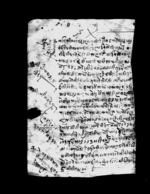A loan agreement involving a slave put up as collateral (VS 1976)
ID: K_0281_0045
Edited and
translated by Manik Bajracharya
in collaboration with
Raju Rimal
Created: 2017-02-28;
Last modified: 2018-06-19
For the metadata of the document, click here
The accompanying edition, translation/synopsis and/or commentary are available under the terms of the Creative Commons Attribution-ShareAlike 4.0 International License
Abstract
This is a deed recording a loan of 142 rupees by Vīra Bāhādura to Lāl Bāhādura Khatrī Chetrī. A male slave is offered as security.Diplomatic edition
[1r]
1श्रीः\1⟪१५७नं⟫1स्हीलाल्वा2हादुरषत्री
3छेत्री1साछी1स्ही:दांन्वाहादुरष
2त्रीछेत्री¯¯¯¯¯¯¯¯¯१1स्हीहीरासींथापाछेत्री¯¯¯¯¯¯¯¯¯१1 [Fingerprint] वीरषत्रीछेत्री¯¯¯¯¯¯¯¯¯१1अभयसींषत्रीछेत्री¯¯¯¯¯¯¯¯¯१1स्ही:लेःषत्कोमअसा
2मीलाल्वाहादुरषत्री
3छेत्रीसदरछु¯¯¯¯¯¯¯¯¯1स्वस्तिश्रीसम्वत्१९७६साल्मीतीपौष८गतेवार३मासु
2वदीनेधनीकानामवीर्तारस्पुरगाऊवश्नेवीरवाहादुरष•
3त्रीछेत्रीधनवेहोरीनीकाणमऐंगाऊवश्नेलाल्
4वाहादुरषत्रीछेत्रीगतलीचादीकाचलंसारका
5मोरू१४२अक्षेरूपीये़कसये़वय़ालीस्रुपैञा•
6लीय़ाकोठीक्साचोहोवाफत्दंन्डवीसये़माहीरा•
7सींथापालेतीरीदीय़ाकोहुनालेनीजहीरासींथापाला
8ईतीर्नलीय़ाकोहस्वारुपैञाकोभाकाकरव़रये़ही
9आउन्या७७साल्काजेस्ठमैनाकादीण१२जाहा
10लेषीय़ाकारुपैञासापटकोसापटवुझाउलास्वा
11भाकानाघ्येभने:ये़सैमीतीमाधीतोरहेकोरवेकमारो
12चाररत्नकोचोसोभय़ाकोकमारोआर्कोपरम्
13भट्टानलेषीये़सैकागजकोसदरगरीलीनु•पछीम
14रेभाग्येमीतीव़ारमोरेभाग्येनीमेक्कमारोलेउभनी
15मआसामीलेनभंनुमीतीपारमोरेभाग्येमेरोकमारो
16लेउरूपैञावुझाउभनीनभंनु•मेरामंमाषुसीरा
17जीलेदाम्दोहोरीवुझीलीञाय़ोतमसुकलेषीदी
18य़ाकोसाउकापुर्वतर्फकोदलानमालेषीदीय़ाको
19होये़सवेहोराकासाछीफट्केपट्टीलेषीदीय़ाको
20छु•मीतीसदरशु¯¯¯¯¯¯¯¯¯
Translation
[1r]
Number 1571
[Signature]: Lāl Bāhādura Khatrī Chetrī
Witnesses:
[Signature]: Dān Bāhādura Khatrī Chetrī
[Signature]: Hīrā Siṃ Thāpā Chetrī
[Fingerprint]: Vīra Khatrī Chetrī
Abhaya Siṃ Khatrī Chetrī
[Signature]: I, Lāl Bāhādura Khatrī Chetrī, the debtor of [this] deed, have been approved [as such].
Hail! On the auspicious Monday of the 8th solar day (gate) of Pauṣa in the [Vikrama] era year 1976 (1919 CE), the debtor (dhana behorīnī), Lāl Bāhādura Khatrī Chetrī by name, resident of Raspura Village, has truly received current silver mohara rupaiyās 142 from the creditor (dhanī), Vīra Bāhādura Khatrī Chetrī by name, resident of the same village. I have borrowed this money to repay Hirā Siṃ Thāpā, inasmuch as the latter paid [a similar amount earlier as] the fine for an offence (bāphat) [of mine]. I solemnly promise to return the same amount [of money] as borrowed2 on the 12th of the month of Jyeṣṭha in the coming year [VS 19]77. If this promise is broken, [Vīra Bāhādura] shall take in his ownership, on that same date, the pledged male slave Rave, who possesses the four gems,3 considering this deed as valid [in] itself, without [any need] for a separate paramabhaṭṭā to be written. If [the slave] dies or escapes—[that is,] if he dies or escapes before the [fixed] date—I, the debtor, shall not say: "Give me the value of the labour (nimek) [of the slave] or [the price of] the slave." If he dies or escapes beyond the [promised] date, [the creditor] shall not tell: "Give me my slave [or] pay me the [debt] money." I have gladly and of my own free will received this money. This agreement (tamasuka) was written on the creditor's eastern veranda. I have written down the witnesses to this document in the margin (phaṭke). The [aforementioned] date is valid. Auspiciousness.
Commentary
This document records a loan of money taken out by Lāl Bāhādura from Vīra Bāhādura in a village called Raspura. The identity of this village is unknown. However, since this document was among a bundle of documents from Pyuthana, Raspura is presumably a village in the same general area. The document mentions that the debtor took the loan in order to repay an earlier loan from Hīrā Siṃ Thāpā, who had paid at fine on his behalf for an offence committed earlier.
The document mentions that the debtor has put up his slave Rave as collateral for the loan. The slave would automatically pass to the creditor if the loan was defaulted.
This document can be related to Article 80 of the Mulukī Ain (MA-KM VS 2022) concerning rules regarding the escape of slaves.

